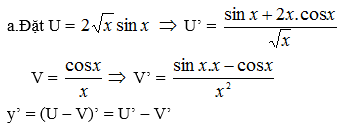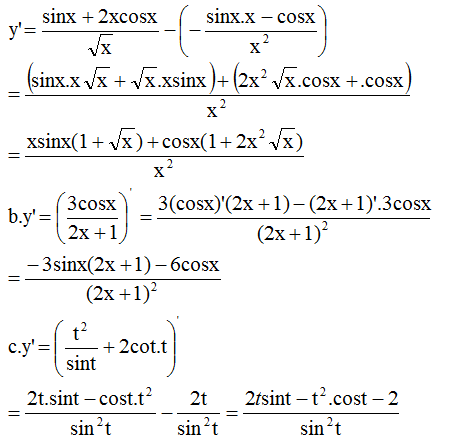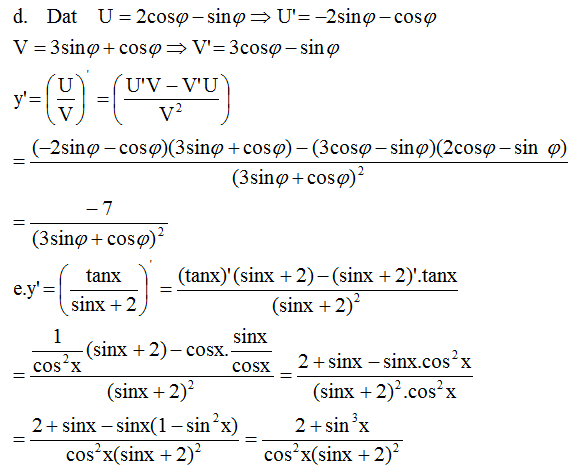
Hãy nhập câu hỏi của bạn vào đây, nếu là tài khoản VIP, bạn sẽ được ưu tiên trả lời.

GPT: \(\dfrac{\left(\sin x-\cos x\right)\left(\sin2x-3\right)-\sin2x-\cos2x+1}{2\sin x-\sqrt{2}}=0\)

ĐKXĐ: \(sinx\ne\dfrac{\sqrt{2}}{2}\)
\(\left(sinx-cosx\right)\left(sin2x-3\right)+\left(sinx-cosx\right)^2+\left(sin^2x-cos^2x\right)=0\)
\(\Leftrightarrow\left(sinx-cosx\right)\left(sin2x-3\right)+\left(sinx-cosx\right)^2+\left(sinx-cosx\right)\left(sinx+cosx\right)=0\)
\(\Leftrightarrow\left(sinx-cosx\right)\left(sin2x-3+2sinx\right)=0\)
\(\Leftrightarrow\left[{}\begin{matrix}sinx-cosx=0\\\left(sin2x-1\right)+2\left(sinx+1\right)=0\left(vô-nghiệm\right)\end{matrix}\right.\)
\(\Leftrightarrow x=\dfrac{\pi}{4}+k\pi\)
Kết hợp ĐKXĐ \(\Rightarrow x=-\dfrac{\pi}{4}+k2\pi\)

\(\sin\left(x-\dfrac{\pi}{2}\right)=1\Leftrightarrow x-\dfrac{\pi}{2}=\dfrac{\pi}{2}+k2\pi\)
\(\Leftrightarrow x=\pi+k2\pi\left(k\in Z\right)\)

\(2sinx+2\sqrt{3}cosx-\sqrt{3}sin2x+cos2x=\sqrt{3}cosx+cos2x-2sinx+2\)
\(\Leftrightarrow4sinx+\sqrt{3}cosx-2\sqrt{3}sinx.cosx-2=0\)
\(\Leftrightarrow-2sinx\left(\sqrt{3}cosx-2\right)+\sqrt{3}cosx-2=0\)
\(\Leftrightarrow\left(1-2sinx\right)\left(\sqrt{3}cosx-2\right)=0\)
\(\Leftrightarrow\left[{}\begin{matrix}sinx=\dfrac{1}{2}\\cosx=\dfrac{2}{\sqrt{3}}>1\end{matrix}\right.\)
\(\Leftrightarrow...\)

c.
\(\Leftrightarrow sin\left(3x+\frac{2\pi}{3}\right)=-sin\left(x-\frac{2\pi}{5}-\pi\right)\)
\(\Leftrightarrow sin\left(3x+\frac{2\pi}{3}\right)=sin\left(x-\frac{2\pi}{5}\right)\)
\(\Leftrightarrow\left[{}\begin{matrix}3x+\frac{2\pi}{3}=x-\frac{2\pi}{5}+k2\pi\\3x+\frac{2\pi}{3}=\frac{7\pi}{5}-x+k2\pi\end{matrix}\right.\)
\(\Leftrightarrow\left[{}\begin{matrix}x=-\frac{8\pi}{15}+k\pi\\x=\frac{11\pi}{60}+\frac{k\pi}{2}\end{matrix}\right.\)
d.
\(\Leftrightarrow cos\left(4x+\frac{\pi}{3}\right)=sin\left(\frac{\pi}{4}-x\right)\)
\(\Leftrightarrow cos\left(4x+\frac{\pi}{3}\right)=cos\left(\frac{\pi}{4}+x\right)\)
\(\Leftrightarrow\left[{}\begin{matrix}4x+\frac{\pi}{3}=\frac{\pi}{4}+x+k2\pi\\4x+\frac{\pi}{3}=-\frac{\pi}{4}-x+k2\pi\end{matrix}\right.\)
\(\Leftrightarrow\left[{}\begin{matrix}x=-\frac{\pi}{36}+\frac{k2\pi}{3}\\x=-\frac{7\pi}{60}+\frac{k2\pi}{5}\end{matrix}\right.\)
a.
\(sin\left(2x+1\right)=-cos\left(3x-1\right)\)
\(\Leftrightarrow sin\left(2x+1\right)=sin\left(3x-1-\frac{\pi}{2}\right)\)
\(\Leftrightarrow\left[{}\begin{matrix}3x-1-\frac{\pi}{2}=2x+1+k2\pi\\3x-1-\frac{\pi}{2}=\pi-2x-1+k2\pi\end{matrix}\right.\)
\(\Leftrightarrow\left[{}\begin{matrix}x=\frac{\pi}{2}+2+k2\pi\\x=\frac{3\pi}{10}+\frac{k2\pi}{5}\end{matrix}\right.\)
b.
\(sin\left(2x-\frac{\pi}{6}\right)=sin\left(\frac{\pi}{4}-x\right)\)
\(\Leftrightarrow\left[{}\begin{matrix}2x-\frac{\pi}{6}=\frac{\pi}{4}-x+k2\pi\\2x-\frac{\pi}{6}=\frac{3\pi}{4}+x+k2\pi\end{matrix}\right.\)
\(\Leftrightarrow\left[{}\begin{matrix}x=\frac{5\pi}{36}+\frac{k2\pi}{3}\\x=\frac{11\pi}{12}+k2\pi\end{matrix}\right.\)

Lời giải:ĐK: $\cos 3x>\frac{-1}{2}$
PT $\Rightarrow 4\sin ^2\frac{x}{2}-\sqrt{3}\cos 2x-1-2\cos ^2(x-\frac{3\pi}{4})=0$
$\Leftrightarrow 2(1-\cos x)-\sqrt{3}\cos 2x-2+[1-2\cos ^2(x-\frac{3\pi}{4})]=0$
$\Leftrightarrow -2\cos x-\sqrt{3}\cos 2x-cos (2x-\frac{3\pi}{2})=0$
$\Leftrightarrow 2\cos x+\sqrt{3}\cos 2x+\cos (2x-\frac{3\pi}{2})=0$
$\Leftrightarrow 2\cos x+\sqrt{3}\cos 2x+\sin 2x=0$
$\Leftrightarrow \cos x+\frac{\sqrt{3}}{2}\cos 2x+\frac{1}{2}\sin 2x=0$
$\Leftrightarrow \cos x-\cos (2x+\frac{5\pi}{6})=0
$\Leftrightarrow \cos x=\cos (2x+\frac{5\pi}{6})$
$\Rightarrow x+2k\pi =2x+\frac{5}{6}\pi$ hoặc $-x+2k\pi =2x+\frac{5}{6}\pi$
Vậy......

b)
Với n = 1.
\(VT=B_n=1;VP=\dfrac{1\left(1+1\right)\left(1+2\right)}{6}=1\).
Vậy với n = 1 điều cần chứng minh đúng.
Giả sử nó đúng với n = k.
Nghĩa là: \(B_k=\dfrac{k\left(k+1\right)\left(k+2\right)}{6}\).
Ta sẽ chứng minh nó đúng với \(n=k+1\).
Nghĩa là:
\(B_{k+1}=\dfrac{\left(k+1\right)\left(k+1+1\right)\left(k+1+2\right)}{6}\)\(=\dfrac{\left(k+1\right)\left(k+2\right)\left(k+3\right)}{6}\).
Thật vậy:
\(B_{k+1}=B_k+\dfrac{\left(k+1\right)\left(k+2\right)}{2}\)\(=\dfrac{k\left(k+1\right)\left(k+2\right)}{6}+\dfrac{\left(k+1\right)\left(k+2\right)}{2}\)\(=\dfrac{\left(k+1\right)\left(k+2\right)\left(k+3\right)}{6}\).
Vậy điều cần chứng minh đúng với mọi n.
c)
Với \(n=1\)
\(VT=S_n=sinx\); \(VP=\dfrac{sin\dfrac{x}{2}sin\dfrac{2}{2}x}{sin\dfrac{x}{2}}=sinx\)
Vậy điều cần chứng minh đúng với \(n=1\).
Giả sử điều cần chứng minh đúng với \(n=k\).
Nghĩa là: \(S_k=\dfrac{sin\dfrac{kx}{2}sin\dfrac{\left(k+1\right)x}{2}}{sin\dfrac{x}{2}}\).
Ta cần chứng minh nó đúng với \(n=k+1\):
Nghĩa là: \(S_{k+1}=\dfrac{sin\dfrac{\left(k+1\right)x}{2}sin\dfrac{\left(k+2\right)x}{2}}{sin\dfrac{x}{2}}\).
Thật vậy từ giả thiết quy nạp ta có:
\(S_{k+1}-S_k\)\(=\dfrac{sin\dfrac{\left(k+1\right)x}{2}sin\dfrac{\left(k+2\right)x}{2}}{sin\dfrac{x}{2}}-\dfrac{sin\dfrac{kx}{2}sin\dfrac{\left(k+1\right)x}{2}}{sin\dfrac{x}{2}}\)
\(=\dfrac{sin\dfrac{\left(k+1\right)x}{2}}{sin\dfrac{x}{2}}.\left[sin\dfrac{\left(k+2\right)x}{2}-sin\dfrac{kx}{2}\right]\)
\(=\dfrac{sin\dfrac{\left(k+1\right)x}{2}}{sin\dfrac{x}{2}}.2cos\dfrac{\left(k+1\right)x}{2}sim\dfrac{x}{2}\)\(=2sin\dfrac{\left(k+1\right)x}{2}cos\dfrac{\left(k+1\right)x}{2}=2sin\left(k+1\right)x\).
Vì vậy \(S_{k+1}=S_k+sin\left(k+1\right)x\).
Vậy điều cần chứng minh đúng với mọi n.

\(1+\sin\dfrac{x}{2}\sin x-\cos\dfrac{x}{2}\sin^2x=2\cos^2\left(\dfrac{\Pi}{4}-\dfrac{x}{2}\right)\)
\(\Leftrightarrow1+\sin\dfrac{x}{2}\sin x-\cos\dfrac{x}{2}\sin^2x=2\left(\dfrac{\sqrt{2}}{2}\cos\dfrac{x}{2}+\dfrac{\sqrt{2}}{2}\sin\dfrac{x}{2}\right)^2\)
\(\Leftrightarrow1+2\sin^2\dfrac{x}{2}\cos\dfrac{x}{2}-\cos\dfrac{x}{2}\left(2\sin\dfrac{x}{2}\cos\dfrac{x}{2}\right)^2=1+2\sin\dfrac{x}{2}\cos\dfrac{x}{2}\)
\(\Leftrightarrow2\sin^2\dfrac{x}{2}\cos\dfrac{x}{2}-4\cos^3\dfrac{x}{2}\sin^2\dfrac{x}{2}-2\sin\dfrac{x}{2}\cos\dfrac{x}{2}=0\)
\(\Leftrightarrow2\sin\dfrac{x}{2}\cos\dfrac{x}{2}\left(\sin\dfrac{x}{2}-2\sin\dfrac{x}{2}\cos^2\dfrac{x}{2}-1\right)=0\)
\(\Leftrightarrow2\sin\dfrac{x}{2}\cos\dfrac{x}{2}\left(\sin\dfrac{x}{2}-2\sin\dfrac{x}{2}\left(1-\sin^2\dfrac{x}{2}\right)-1\right)=0\)
\(\Leftrightarrow2\sin\dfrac{x}{2}\cos\dfrac{x}{2}.\left(\sin\dfrac{x}{2}-1\right)\left(2\sin^2\dfrac{x}{2}+2\sin\dfrac{x}{2}+1\right)=0\)



\(\sin x=\dfrac{1}{2}\Leftrightarrow\sin x=\sin\dfrac{\pi}{6}\)
\(\Leftrightarrow\left[{}\begin{matrix}x=\dfrac{\pi}{6}+k2\pi\\x=\pi-\dfrac{\pi}{6}+k2\pi\end{matrix}\right.\Leftrightarrow\left[{}\begin{matrix}x=\dfrac{\pi}{6}+k2\pi\\x=\dfrac{5\pi}{6}+k2\pi\end{matrix}\right.\left(k\in Z\right)\)